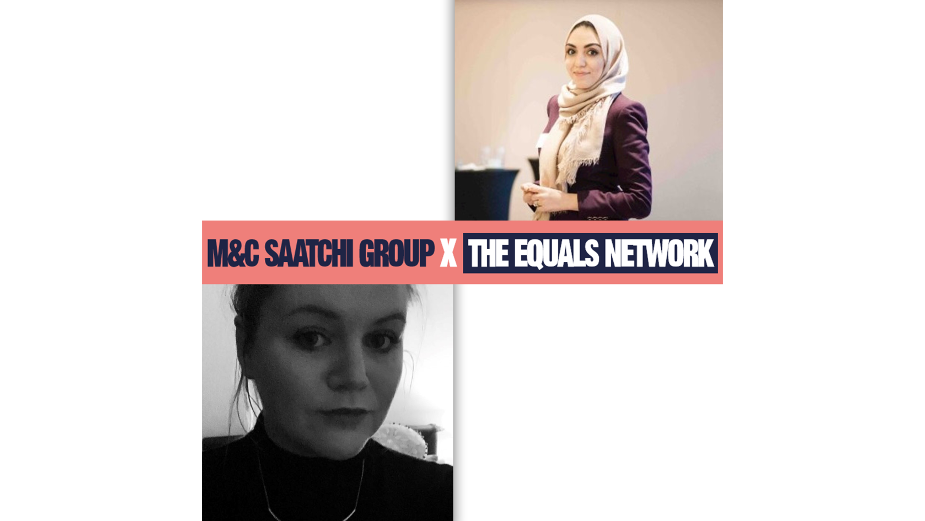
“You Just Need More Women at the Top”

International Women's Day fell at the beginning of a disheartening week for women this year. In the UK, the week began with brands scrabbling to be recognised for their progress on gender equality (some more legitimately than others), then moved on to Meghan Markle being labelled a liar by many in the media, before the news cycle turned onto the terrible news emerging around the disappearance and death of Sarah Everard, provoking a debate around men’s violence against women, a predictable #NotAllMen reaction from some, before police were criticised for their response to a vigil held for Sarah Everard and other women lost to male violence. Those are just some of the more prominent discussions around gender that were in the aether when I spoke to the co-chairs of M&C Saatchi Group’s Equals Network about the direction the agency is heading on gender balance.
Tanya Brown, co-chair of M&C Saatchi Group’s Equals Network notes that while they used International Women’s Day as an opportunity to announce a number of new initiatives internally, we all must continue driving progress in these areas way beyond the prescribed days, weeks and months that prompt such discussions. Speaking at the end of that long week she says: “It has to be lasting. M&C Saatchi are launching initiatives now, but it’s about making sure that change is enduring and putting steps into place to make sure that that is the case.”
Her fellow Equals Network co-chair Rukaya El-Turki agrees. “International Women's Day has been a particular opportunity to start the conversation,” she says. Looking at the discussions that have occurred in culture around issues of gender, she observes that they caused “a bit of discomfort for some people.” But that’s no bad thing. “Understanding the importance of discomfort, that's what drives change.”
About three years ago M&C Saatchi Group set up six employee-led networks that represent underrepresented groups within its workforce. These provide a platform for discussion and influence, helping to ensure all voices are heard and that people are able to influence the group’s policy creation and delivery. The Juniors Network represents people with less than five years’ industry experience, the Proud Network represents LGBTQI+ employees, the Family Network represents those with caregiving responsibilities, the Heritage Network represents BAME employees, the Together Network aims to promote positive well-being for employees throughout the business, and the Equals Network represents women and non-binary employees.
At the start of 2021, the M&C Saatchi Group launched their new strategy to navigate, create and lead meaningful change for their clients, people, and the world. “Meaningful change is also about our culture and equal opportunities for everyone,” says Rukaya.
Tanya adds that anyone in the advertising industry should approach that claim of ‘meaningful change’ with a healthy bit of scepticism. “What does that actually mean?” But she’s confident that the Equals Network will be able to show rather than tell. “What we've been enabled to do is make meaningful change internally.”
Rukaya explains where the latest initiatives to come out of the Equals Network emerged from. There are two halves of the representation gap that they want to address: “Businesses need to have representation of women and all genders, in order for the workforce to feel like they have role models that they see themselves in, and then the other side of that is raising awareness, challenging cultural norms that exist as an industry and within agencies. By trying to challenge those norms through representation, we're bridging the gap in the gender equality balance.”
If businesses have better representation and intersectionality at the top of their structure, “we know that statistically has better outcomes, both for business but also more junior people. And so it seems like a natural jumping-off point,” adds Tanya. “The first step was to take stock of where we were, to understand that and reflect on everything we know. The next step is to bring it to life in an authentic way.”
As part of that mission, M&C Saatchi Group is forming an advisory panel made up of women and non-binary people from within the business that sits alongside existing senior leadership boards at a global level. The agency is 54% female. But at a senior level that doesn't correlate. And that won’t change straight away. “You can't just fire a load of men and hire a load of women,” says Rukaya. “The fix isn't as easy as that.”
The new panel is there, therefore, to represent over half of the agency’s workforce on a senior level, so that all decisions that are made within the business that impact over 50% of the workforce are heard and the female perspective is represented at that level. “It holds the existing leadership, that's predominantly male, to account,” says Rukaya.
Nurturing future female leaders is a focus too. As well as giving women and non-binary people opportunities to feed into policy and strategy, Rukaya says the aim is to make sure the people on the panel are nurtured and mentored by existing CEOs and put onto that trajectory to then be in leadership positions, to balance out the gender gap.
The next step is for the panel to serve as role models themselves, says Rukaya. “We will look at more junior members of staff and how they can be mentored by this advisory panel, they can then be replaced [as they’re promoted]. It's about creating something that can be co-created with these other women, and they take ownership of driving that as well.”
Tanya stresses that this idea needs to be put into practice and consistently monitored internally. No other agency has created something exactly like this, so the Equals Network is planning multiple iterations into its approach. “We can adjust and pivot if we need to,” says Tanya.
The scope of what the Equals Network is aiming for is that it can radiate out and influence culture. “You can't change culture if the end game isn't visible,” says Rukaya. “You can say you’re going to challenge women being talked over or silenced in meetings or not being given the same opportunities as men - all those things that are actually happening - you can address that, but if there are no women at the top, we've not done anything. So it does need to be creating a space at a leadership level to drive decision making, that is representative. It's about changing culture and challenging norms.”
“What do we want our agency known for? We work for brands, we work on their brand values, we work on brand reputation. This is about how we create a culture where women can be empathetic leaders or compassionate leaders, rather than feeling like leadership is about being the loudest person in the room. I think it is really about challenging that culture and creating an enabling culture that allows all genders to feel equal.”
In recent years a lot of initiatives have emerged to try and promote gender equality within the advertising industry. Unconscious bias training has become common, for example. But the Equals Network is looking to take things beyond where initiatives have gone already. “I think we've got to a point now where there's probably quite a high level of saturation,” says Tanya. “People know they have unconscious biases. But what I've spoken to my senior leadership team about is taking that to the next step and co-creating the solution themselves. That's what part of the function of this female advisory panel is: them saying what they think is going to work. You absolutely can look at best global best practice, or best practice locally, but I think some of the time when you are trying to take the next step, you need to take that and then jump from it a bit. That's something we've been keen on, not just looking at what's already here, but how can we use it and go the extra mile?”
Rukaya thinks it can be put even more clearly: “I don't think anyone's done it right. Lots of people in the industry claim to know how to create more diversity, but they're not. I think it's brutally simple: you just need more women at the top, you just need that representation. And I think it's easy to make excuses, to say you don't know how to get more women at the top. Why can't you? What's stopping you? There's a load of women in our industry, who are very capable to be in leadership positions, all you need to do is offer them a seat at the table. And I think that we over complicate a really simple action. All you need to do is create the space, put the women in those roles, and you will then see how their impact will have a positive influence on the business and on the culture and everything else that comes with it.”













